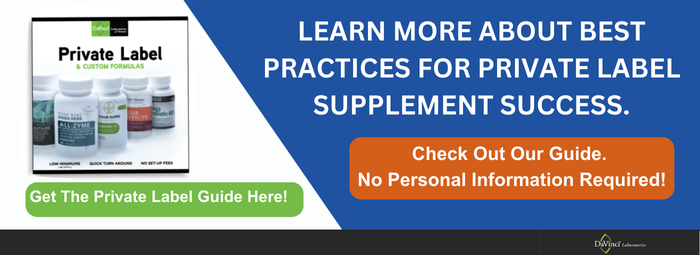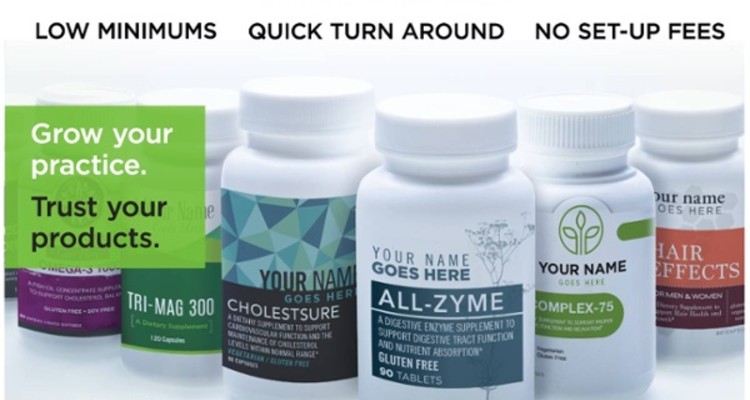
The idea behind Truth in labeling is simple: what you see is what you get. In other words, what is stated on the supplement label is what the product delivers.
Some supplement companies find loopholes in regulatory guidelines by making untrue claims, hiding inactive ingredients, or misrepresenting the amount of a bioavailable nutrient. Thankfully, you can help your customers and patients keep an eye out for certain red flags when buying supplements, and be an industry leader by offering professional grade products.
As a private label supplement vendor, you want your patients and customers to trust that your products are quality tested, safe, and effective. Your labeling should be 100% transparent.
Read on to learn more about breaking down product ingredients in an honest and easy-to-understand way.
what is truth in labeling?
Not all supplement companies make the choice to be completely transparent with their labeling, so doing so sets you apart from the crowd right off the bat. This means avoiding watered-down formulas or using extra fillers, and ensuring your products offer the therapeutic level of ingredients and potent formulas your clients want.
Truth in labeling means the label reflects the product exactly, and ingredients are backed up with certificates of analyses and third-party lab testing.

how to break down private label supplement ingredients
You want consumers to understand the ingredients on the supplement label and know they can trust it. The following approaches will help your buyers build confidence in your products and turn them into loyal customers.
supplement facts that meet label regulations
While any trusted supplement company will strictly follow FDA supplement label guidelines, the reality is that this federal agency does not always perform widespread checks. To assure your customers that your product labels are transparent and trustworthy, choose a private label supplement supplier that guarantees ongoing third-party testing and verification. Universal standards are lacking, but third-party testing is essential to instill trust in any product.
readily share certificate of analysis
Along similar lines, always make it easy for buyers to access your supplement’s certificate of analysis. Ideally, this certification comes from an independent, third-party laboratory. As a private label supplement vendor, your products usually come from manufacturers who source their ingredients from third-party suppliers. cGMPs require testing to confirm the strength, identity, composition, and purity of every ingredient.
include all inactive ingredients
Sometimes, certain inactive ingredients are needed to enhance a nutrient's delivery or help the product itself bind together. Some are harmless, but others can be potentially harmful and not held to quality standards. It’s essential to carefully list the inactive ingredients in your products, as some may not be suitable for vegans, vegetarians, or people with certain intolerances.
share ingredient fact sheet
The supplement facts on your label provide the nutritional information panel of any product. Many supplement vendors sell products that promise an ingredient in specific amounts when the bioavailable amount is actually much lower.
discuss ingredients and your commitment to truth in labeling
Your commitment to Truth in Labeling is something patients and consumers value. Share your quality standards with your customers through social media, on your website, and in person (when applicable). This is a crucial way to build a loyal customer base who will talk positively about your supplements with friends and family.
explain nutrient form
Explain why you’ve decided to deliver nutrients in any particular form (i.e., the benefits of liposomal delivery for certain ingredients, magnesium glycinate versus citrate or another form, etc.). This transparency helps customers understand how their supplement will deliver the desired effect, depending on their health goals.
consider using trademarked ingredients
Another way to distinguish your private label supplements from other brands is by using branded or trademarked ingredients. Branded ingredients are shown on a supplement label with a ® or ™ symbol. To trademark or patent an ingredient, manufacturers need to invest substantial time and money in its research. This investment means consumers can trust the efficacy of their supplement, and as a private label vendor, you can feel confident your customers receive the best quality ingredients available.
conclusion
The supplement industry has become increasingly challenging to navigate for the average consumer. Comparing and weighing factors like pricing, quality, and ingredient bioavailability is no easy task. By creating a private label brand that values Truth in Labeling, you can build a business that people trust.












%20(1).jpg)





